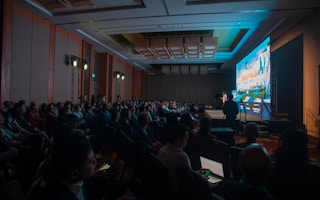Seven finalists have been unveiled for the 2024 edition of The Liveability Challenge (TLC) which received a record-breaking number of more than 1,000 submissions across more than 100 countries. Innovations such as sustainable aviation fuel and cricket-derived protein made the shortlist for the first time.
To continue reading, subscribe to Eco‑Business.
There's something for everyone. We offer a range of subscription plans.
- Access our stories and receive our Insights Weekly newsletter with the free EB Member plan.
- Unlock unlimited access to our content and archive with EB Circle.
- Publish your content with EB Premium.
This year marks the seventh edition of TLC, a global innovation platform that hunts for solutions to the biggest sustainability challenges facing cities in the tropics, presented by Temasek Foundation and organised by Eco-Business. Finalists will now compete for S$2.5 million (US$1.86 million) in funding at the Grand Finale to be held at Ecosperity Week, a three day sustainability-themed conference by Temasek.
This year’s edition of TLC featured two tracks: climate change, and food and nutrition. The finalist teams were selected for their disruptive technologies which have significant potential for impact and comes from across the world including from Singapore, Canada, The Netherlands, Spain, and Vietnam.
This year’s finalists are:
Climate change
1. Team: bound4blue (Spain)
Solution: Wind-assisted propulsion suction sails to reduce fuel consumption for ships by 40 per cent.
2. Team: GAFT (The Netherlands)
Solution: Scaling the supply of carbon negative sustainable aviation fuel by producing clean ‘used cooking oil’ substitute from carbon dioxide.
3. Team: Green COP (Singapore)
Solution: Decarbonising maritime transport by 50 per cent with high energy density drop-in biofuel blend produced from agri-waste.
4. Team: Nandina REM (Singapore)
Solution: Producing industry-grade, circular carbon fibre materials recovered from aircraft with more than 70 per cent carbon emissions reduction.
Food and nutrition
5. Team: Cricket One (Vietnam)
Solution: Scalable nutritious superfood that has a carbon footprint 100 times lower than beef.
6. Team: Terra Bioindustries Inc (Canada)
Solution: High-value proteins and sugars production at 50 per cent lower emissions from the valorisation of agri-food side streams.
7. Team: tHEMEatCompany Pte Ltd (Singapore)
Solution: Vegan ingredient that makes alternative protein products look, cook, smell and taste like real meats.
Countdown to the finale
In addition to the million-dollar prizes, winners will pitch to the region’s established investors for an additional S$500,000 in investment prizes including Enterprise Singapore, impact investment fund Octave Wellbeing Economy Fund, and venture capital funds AeraVC and TRIREC.
“We are so encouraged to have received over 1,000 stand-out submissions from more than 100 countries across the world despite the shorter submission window due to Ecosperity being earlier this year. This represents the incredible momentum we are seeing in climate tech globally and underscores our need to scale financing to fund these solutions that address specific hard-to-abate sectors so they can reach commercial markets,” said Jessica Cheam, founder and managing director of Eco-Business.
“The final seven teams selected by our steering committees this year bring a diverse range of practical solutions that can decarbonise the economy and strengthen the region’s food and nutrition systems,” she added.
The shortlisting panels are represented by ADM Ventures, Engie Factory, Singapore’s National Climate Change Secretariat, New Energy Nexus, Nurasa, Singapore Food Agency, SMART Innovation Centre, The Yield Lab, Vertex Ventures, Wavemaker Impact, Temasek Foundation, and Eco-Business.
The grand finale will take place on 17 April at Marina Bay Sands in Singapore.
Last year’s Liveability Challenge winners were a clean fuels venture in the United States and a Singapore-based aquaculture vaccine developer. Among notable previous winners is US-based Equatic, formerly known as SeaChange, which is building the world’s largest ocean decarbonisation plant in Singapore; Teora, a start-up developing orally-delivered solution that prevents and treats scale drop disease virus in Asian sea bass, and TurtleTree Labs, a precision fermentation and cell-based technology start-up.










